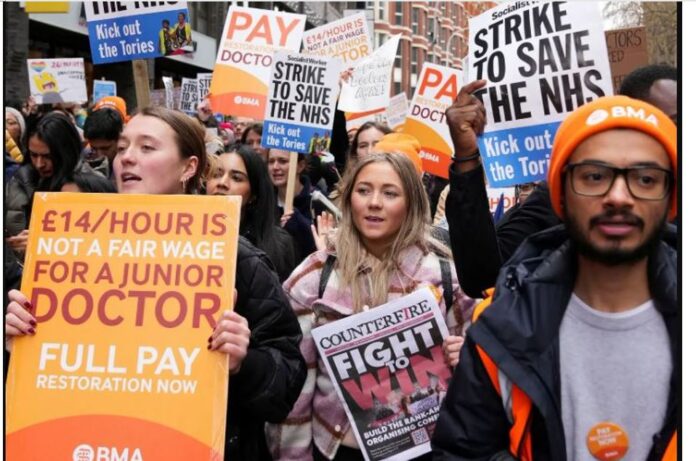UK doctors ground healthcare delivery as they reject pay rise increase
By Jeph Ajobaju, Chief Copy Editor
Junior doctors in public hospitals in England on Thursday staged the biggest walkout in the history of the United Kingdom National Health Service (NHS), prompting fears for patient safety.
The unprecedented five-day stoppage over pay and staff retention is the latest in eight months of industrial action across the NHS, which is already reeling from a vast pandemic backlog.
The chair of the British Medical Association (BMA’s) UK council said Prime Minister Rishi Sunak’s pay increase offer “fails to address” years of below-inflation pay deals, according to The Guardian (UK).
Phil Banfield, a Professor, said the government’s offer “is exactly why so many doctors are feeling they have no option but to take industrial action”.
Earlier, Sunak issued a warning to trade unions and workers still involved in strikes and industrial action, telling a Downing Street press conference the new pay offer is “final”.
All four teaching unions recommended accepting a pay offer. In a joint statement with Sunak, they said: “A 6.5% increase for teachers and school leaders recognises the vital role that teachers play in our country and ensures that teaching will continue to be an attractive profession.”
But a 27-year-old junior doctor, Arjan Sing, said on a picket line outside London’s University College Hospital: “The NHS has been running on goodwill and now this is the last chance to change that.”
He disclosed colleagues are planning to leave for countries that “care about their doctors”.
“Doctors have realised they work in a global market, they’re not restricted to this country,” he added, per reporting by AFP.
Nurses, ambulance staff and other medical workers have all joined picket lines in recent months, adding to the pressure on patient appointments.
The industrial action by junior doctors – those below the consultant level – will run until 7:00 am (0600 GMT) next Tuesday, July 18.
It comes against a background of walk-outs across the economy from train drivers to lawyers over the past year as the UK battles a crippling cost-of-living crisis.
Senior hospital doctors, known as consultants, in England, will also begin a 48-hour strike on July 20, with radiographers following suit from July 25.
_________________________________________________________________
Related articles:
UK targets 300,000 doctors and nurses in new recruitment push
Nigeria reaps fruit of neglect as 9,000 doctors and 7,256 nurses emigrate
60% of doctors planning to leave Nigeria
__________________________________________________________________
Medics have seen 26% pay cut in 15 years
The bitter row between junior doctors and the government has seen them call for their 2008-2009 pay levels to be restored – something the government says would mean an average pay award of about 35 per cent, according to AFP, per reporting by Vanguard.
The BMA’s Junior Doctors Committee says medics have effectively had a 26 per cent pay cut in real terms in the last 15 years, as salaries have failed to keep pace with soaring inflation.
The government claims that backdating their pay to reflect inflation since 2008 is too costly and has instead offered an extra five per cent, as it battles to reduce inflation.
“Today marks the start of the longest single walkout by doctors in the NHS’s history, but this is still not a record that needs to go into the history books,” BMA leaders Robert Laurenson and Vivek Trivedi said.
“We can call this strike off today if the UK government will simply follow the example of the government in Scotland and drop their nonsensical precondition of not talking whilst strikes are announced and produce an offer which is credible to the doctors they are speaking with.”
Similar stoppages in June and April resulted in massive disruption with hundreds of thousands of hospital appointments and operations rescheduled.
“The complete inflexibility we see from the UK government today is baffling, frustrating, and ultimately destructive for everyone who wants waiting lists to go down and NHS staffing numbers to go up,” Laurenson and Trivedi added.
About seven million people were waiting for treatment in April – a record – with nearly three million waiting more than 18 months, according to the BMA.













